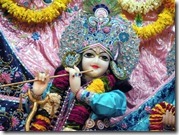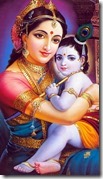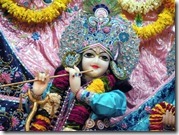![[Govardhana Shila]](https://krishnasmercy.files.wordpress.com/2020/12/image.png?w=119&h=131) “As the director of different kinds of clouds, Indra called for the samvartaka. This cloud is invited when there is a need to devastate the whole cosmic manifestation. The samvartaka was ordered by Indra to go over Vrindavana and inundate the whole area with an extensive flood. Demonically, Indra thought himself to be the all-powerful supreme personality.” (Krishna, The Supreme Personality of Godhead, Vol 1, Ch 25)
“As the director of different kinds of clouds, Indra called for the samvartaka. This cloud is invited when there is a need to devastate the whole cosmic manifestation. The samvartaka was ordered by Indra to go over Vrindavana and inundate the whole area with an extensive flood. Demonically, Indra thought himself to be the all-powerful supreme personality.” (Krishna, The Supreme Personality of Godhead, Vol 1, Ch 25)
Download this episode (right click and save)
“This will certainly come across as one of the strangest questions you receive, so bear with me. I want to be able to phrase it properly. I guess you could say I will describe a certain type of behavior. It is not uncommon. Many people fall victim to it. I am not sure where it fits into the common presentation of the need for bhakti-yoga, in the modern day.
“Let’s say that a famous person becomes embroiled in a scandal. It could be a politician, someone running for the highest office in the land. Corruption gets uncovered. Lewd photographs. Evidence of rampant criminal behavior.
“The accidental revelations are through the son of the politician. They are troubled, to say the least. Drug abuse. Alcohol addiction. Illicit connection with women. In the latest scandal, media entities get ahold of this politician’s son’s photographs stored on a computer.
“Boy oh boy, these pictures are bad. I mean really bad. A friend of mine keeps telling me about them, as they are sporadically made public. I feel it is wrong to even talk about, to take joy in someone’s failures. At the same time, this is how gossip works. This is why there is an entire industry revolving around the day-to-day happenings of celebrities.
“How do we avoid this behavior? I don’t think it is mentioned in the four regulative principles, as given by His Divine Grace A.C. Bhaktivedanta Swami Prabhupada in the parampara system. I guess you could say it is advised to avoid idle gossip. Shri Chaitanya Mahaprabhu says to not engage in gramya-katha, which is talk of the village.
“I guess I want to address the underlying cause. It is one thing to say to avoid this and don’t do that, but it would be easier to find the proper path if I knew exactly what was causing the attention and interest in the first place. Do you see what I am saying?”
One of the weaknesses associated with a life devoted to sense gratification is envy. No matter how much I enjoy, someone will always be in a superior position. No matter how much money I have, there are rivals. This is because none of us can become God. His position is taken since time immemorial.
Even if you become the king of heaven, the leader in svarga-loka, you are not immune to envy and jealousy. We can study the incident of the first Govardhana Puja. If you are enjoying soma-rasa and have attendants to cater to your every need, why would you be interested with what is happening on earth?
In this case the people of a small rural community decided to ignore Indra for a single time in a year. They were accustomed to worshiping him, and the king of heaven happily received the attention. It was a formal worship in his honor, yajna.
At the insistence of Shri Krishna, who was a small boy at the time, the people worshiped a nearby hill instead. They directed their offerings to Govardhana, which confirmed the genuineness of this newly created ritual by speaking to the people. Shri Krishna assumed the identity of the hill, proving that God’s land is as good as God.
Indra became so incensed that he decided to retaliate. He wasn’t necessarily taking pleasure in someone else’s pain, but he was consumed by envy. If successful, he would be able to stand back and be happy at the destruction that he caused. It would be happiness at the expense of someone else’s destruction.
The potential victims were innocent women, children, cows, trees, and village leaders. As previously stated, Krishna was a mere child, so if He were swept away by the rainstorm dropped by Indra that would be a tragedy under any normal definition of the word.
Fortunately, Krishna stopped the crisis. The people were safe and secure. The same Govardhana that they just worshiped ended up protecting them. Projected into the air, above Krishna’s head, that large tract of land served as the world’s most amazing umbrella. Krishna shielded the people from Indra’s vengeance.
It is an indication of saintly life to be more focused on the pleasure of the Supreme Personality of Godhead. The comparison is to the swan. Those who are still in material life, not caring at all about advancing in consciousness, are like crows. The supreme swan, paramahamsa, always sees God wherever they go. They do not take joy in another’s pain, whereas the crow is always rummaging through garbage, desperate to find some truth in a life otherwise rooted in illusion.
![[Govardhana Shila]](https://krishnasmercy.files.wordpress.com/2020/12/image-1.png?w=204&h=226) The solution to every deficiency in character is increased association with paramahamsas and the person that they worship. In other words, hearing stories such as the first Govardhana Puja and directly calling out to the lifter of that great hill can purify unwanted characteristics: Hare Krishna Hare Krishna, Krishna Krishna, Hare Hare, Hare Rama Hare Rama, Rama Rama, Hare Hare.
The solution to every deficiency in character is increased association with paramahamsas and the person that they worship. In other words, hearing stories such as the first Govardhana Puja and directly calling out to the lifter of that great hill can purify unwanted characteristics: Hare Krishna Hare Krishna, Krishna Krishna, Hare Hare, Hare Rama Hare Rama, Rama Rama, Hare Hare.
In Closing:
To you this truth confiding,
That feeling like joyriding.
Through another’s wreck,
Daily latest news to check.
How purification then to come,
When by this illusion done?
Shelter of Govardhana’s lifter take,
Purity through life of devotion make.

 “And whoever, at the time of death, quits his body, remembering Me alone, at once attains My nature. Of this there is no doubt.” (Lord Krishna, Bhagavad-gita, 8.5)
“And whoever, at the time of death, quits his body, remembering Me alone, at once attains My nature. Of this there is no doubt.” (Lord Krishna, Bhagavad-gita, 8.5)  “To me, anything is easier than taking care of a small child day after day. Sorry to say, but I don’t think men are cut out for this. I have so much more appreciation for mothers. No one can do what they do. I am not saying that to win points or look politically correct. It is how I genuinely feel.”
“To me, anything is easier than taking care of a small child day after day. Sorry to say, but I don’t think men are cut out for this. I have so much more appreciation for mothers. No one can do what they do. I am not saying that to win points or look politically correct. It is how I genuinely feel.”  This explains the many rules and regulations. On this day don’t eat until noon. Don’t take grains or beans when the moon is at a certain phase. While eating, limit the focus on the food itself and focus more on the pleasure of the original benefactor, who has given us the chance to experience life, for that chance is for experiencing Him. One who remembers Him at the time of death attains a nature similar to His, where they will always be blissful and knowledgeable.
This explains the many rules and regulations. On this day don’t eat until noon. Don’t take grains or beans when the moon is at a certain phase. While eating, limit the focus on the food itself and focus more on the pleasure of the original benefactor, who has given us the chance to experience life, for that chance is for experiencing Him. One who remembers Him at the time of death attains a nature similar to His, where they will always be blissful and knowledgeable. ![[Krishna's lotus feet]](https://krishnasmercy.files.wordpress.com/2020/11/71.jpg?w=119&h=105) “Lord Brahma said: O son of Kashyapa Muni, please get up, please get up. All good fortune unto you. You are now perfect in the performance of your austerities, and therefore I may give you a benediction. You may now ask from me whatever you desire, and I shall try to fulfill your wish.” (Shrimad Bhagavatam, 7.3.17)
“Lord Brahma said: O son of Kashyapa Muni, please get up, please get up. All good fortune unto you. You are now perfect in the performance of your austerities, and therefore I may give you a benediction. You may now ask from me whatever you desire, and I shall try to fulfill your wish.” (Shrimad Bhagavatam, 7.3.17)![[Six Gosvamis]](https://krishnasmercy.files.wordpress.com/2020/11/six_gosvamis.jpg?w=204&h=168) “It is certainly a difficult standard to reach, but at least it is something to strive for. I may be completely engrossed in sense enjoyment at the moment, but if there is someone I can look up to, emulate to an extent, there is hope for me in the future.
“It is certainly a difficult standard to reach, but at least it is something to strive for. I may be completely engrossed in sense enjoyment at the moment, but if there is someone I can look up to, emulate to an extent, there is hope for me in the future. ![[Krishna's lotus feet]](https://krishnasmercy.files.wordpress.com/2020/11/71-1.jpg?w=204&h=180) Bhagavan’s mercy is such that if a person simply remembers Him and dedicates their life to Him, the necessary qualifications automatically arrive. In other words, I do not need to strive for vairagya independently. The simplest and most basic austerity, such as
Bhagavan’s mercy is such that if a person simply remembers Him and dedicates their life to Him, the necessary qualifications automatically arrive. In other words, I do not need to strive for vairagya independently. The simplest and most basic austerity, such as ![[Rama-Lakshmana]](https://krishnasmercy.files.wordpress.com/2020/11/kgrhqqokkye5sou9qebogsi7ey60_571.jpg?w=119&h=115) “O Lakshmana, do you rule this earth with Me. You are like My second self, so this glorious opportunity has been presented to you as well. O Saumitra, do you enjoy all the pleasures you desire and the fruits of the regal life. My life and this kingdom I covet for your sake alone.” (Lord Rama speaking to Lakshmana, Valmiki Ramayana, Ayodhya Kand, 4.43-44)
“O Lakshmana, do you rule this earth with Me. You are like My second self, so this glorious opportunity has been presented to you as well. O Saumitra, do you enjoy all the pleasures you desire and the fruits of the regal life. My life and this kingdom I covet for your sake alone.” (Lord Rama speaking to Lakshmana, Valmiki Ramayana, Ayodhya Kand, 4.43-44)![[Shri Rama]](https://krishnasmercy.files.wordpress.com/2020/11/sitaramafamily.jpg?w=204&h=267) Bhagavan is in front of the people in the
Bhagavan is in front of the people in the ![[Rama-Lakshmana]](https://krishnasmercy.files.wordpress.com/2020/11/kgrhqqokkye5sou9qebogsi7ey60_571-1.jpg?w=204&h=198) While they can live without a royal kingdom, they cannot live without Rama. To this day they keep Him by their side, always
While they can live without a royal kingdom, they cannot live without Rama. To this day they keep Him by their side, always ![[Govardhana Shila]](https://krishnasmercy.files.wordpress.com/2020/11/image-32.png?w=119&h=125) “As the director of different kinds of clouds, Indra called for the samvartaka. This cloud is invited when there is a need to devastate the whole cosmic manifestation. The samvartaka was ordered by Indra to go over Vrindavana and inundate the whole area with an extensive flood. Demonically, Indra thought himself to be the all-powerful supreme personality.” (
“As the director of different kinds of clouds, Indra called for the samvartaka. This cloud is invited when there is a need to devastate the whole cosmic manifestation. The samvartaka was ordered by Indra to go over Vrindavana and inundate the whole area with an extensive flood. Demonically, Indra thought himself to be the all-powerful supreme personality.” (![[Shri Krishna]](https://krishnasmercy.files.wordpress.com/2020/11/2_krishna_at_sri_mariamman_temple_singapore.jpg?w=200&h=242) A devata is a jiva within the material world, so even though there is a heightened position of power and influence, there are limits. The devas are not absolute in their wielding of authority. They fall under the rule of not being the doer, as nicely expressed by
A devata is a jiva within the material world, so even though there is a heightened position of power and influence, there are limits. The devas are not absolute in their wielding of authority. They fall under the rule of not being the doer, as nicely expressed by ![[Govardhana Shila]](https://krishnasmercy.files.wordpress.com/2020/11/image-33.png?w=204&h=214) In spite of our ambitions and the dream of total dominance, within the material world no one is able to be the topmost person. Shri Krishna’s influence is always here, though only the wise can detect it. They understand that He is on their side, so there is no need for competition.
In spite of our ambitions and the dream of total dominance, within the material world no one is able to be the topmost person. Shri Krishna’s influence is always here, though only the wise can detect it. They understand that He is on their side, so there is no need for competition. ![[Govardhana Shila]](https://krishnasmercy.files.wordpress.com/2020/11/image-29.png?w=119&h=109) “As the director of different kinds of clouds, Indra called for the samvartaka. This cloud is invited when there is a need to devastate the whole cosmic manifestation. The samvartaka was ordered by Indra to go over Vrindavana and inundate the whole area with an extensive flood. Demonically, Indra thought himself to be the all-powerful supreme personality.” (
“As the director of different kinds of clouds, Indra called for the samvartaka. This cloud is invited when there is a need to devastate the whole cosmic manifestation. The samvartaka was ordered by Indra to go over Vrindavana and inundate the whole area with an extensive flood. Demonically, Indra thought himself to be the all-powerful supreme personality.” (![[heavy downpour]](https://krishnasmercy.files.wordpress.com/2020/11/image-30.png?w=204&h=182) Sacrifice, or yajna, is one of those prescribed activities. This is mentioned in Bhagavad-gita. The people of the heavenly realm, in addition to enjoying in many ways, also take care of the earthly population. They are high-level officials, if viewed from a government of the universe perspective. Yajna satisfies them, and in return they distribute much needed rain.
Sacrifice, or yajna, is one of those prescribed activities. This is mentioned in Bhagavad-gita. The people of the heavenly realm, in addition to enjoying in many ways, also take care of the earthly population. They are high-level officials, if viewed from a government of the universe perspective. Yajna satisfies them, and in return they distribute much needed rain. ![[Govardhana Shila]](https://krishnasmercy.files.wordpress.com/2020/11/image-31.png?w=204&h=187) Nanda’s adorable son simply lifted the just-worshiped Govardhana Hill and held it up as an umbrella. He urged others to take safety underneath, and they followed that wise direction. This means that in any place within martya-loka, the place of repeated birth and death, we are always limited in our exercise of ability. The Almighty retains complete control, and He can thereby make our experience within this place a pleasant one, protecting us from devastating rain, if necessary.
Nanda’s adorable son simply lifted the just-worshiped Govardhana Hill and held it up as an umbrella. He urged others to take safety underneath, and they followed that wise direction. This means that in any place within martya-loka, the place of repeated birth and death, we are always limited in our exercise of ability. The Almighty retains complete control, and He can thereby make our experience within this place a pleasant one, protecting us from devastating rain, if necessary. ![[Shri Krishna]](https://krishnasmercy.files.wordpress.com/2020/11/img_0192.jpg?w=119&h=126) “The bewildered spirit soul, under the influence of the three modes of material nature, thinks himself to be the doer of activities, which are in actuality carried out by nature.” (Lord Krishna, Bhagavad-gita, 3.27)
“The bewildered spirit soul, under the influence of the three modes of material nature, thinks himself to be the doer of activities, which are in actuality carried out by nature.” (Lord Krishna, Bhagavad-gita, 3.27)![[court]](https://krishnasmercy.files.wordpress.com/2020/11/image-28.png?w=200&h=154) The actual meaning of the principle is to show that outcomes are not entirely in our hands. We can try to do something, but so many forces out of our control must first cooperate. This could be something as complicated as constructing a building in an urban area or as simple as getting out of bed in the morning.
The actual meaning of the principle is to show that outcomes are not entirely in our hands. We can try to do something, but so many forces out of our control must first cooperate. This could be something as complicated as constructing a building in an urban area or as simple as getting out of bed in the morning. ![[Shri Krishna]](https://krishnasmercy.files.wordpress.com/2020/11/img_0192-1.jpg?w=204&h=216) Bhishma fought for the opposing side, and he was defeated by Arjuna. There was the choice to act in the military conflict, and a higher force determined the outcome. The choice in devotion did not fail. Bhakti remained, up until the end of life, when Bhishma merged into the transcendental body of Narayana, who is the same as Krishna.
Bhishma fought for the opposing side, and he was defeated by Arjuna. There was the choice to act in the military conflict, and a higher force determined the outcome. The choice in devotion did not fail. Bhakti remained, up until the end of life, when Bhishma merged into the transcendental body of Narayana, who is the same as Krishna.